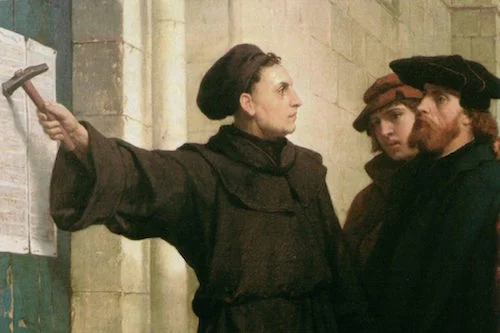The Anxious Agitator: Martin Luther
Poor Martin. He was a fearless rebel, an uncompromising reformer. He shook the Church to its core, sparked violent peasant uprisings and changed Western history forever. Yet that same Martin Luther wrestled with angst in the extreme.
Born more than five hundred years ago into a humble copper miner’s family, it was neither career uncertainty nor economic worry that most troubled young Martin, though I’ll bet that German winter got him down. Martin experienced anxiety of cosmic dimensions. He was petrified by death, hell, and the avenging wrath of God. At twenty years old, weeping and wailing, trembling and doubting, Martin despaired over the salvation of his own soul. He was convinced that God’s grace was utterly blocked by his mortal guilt and that there was just no way out. “To cry unto the Lord, that is beyond us,” he lamented, “for our bad conscience and our sin press down on us, and lie so about our necks so badly that we feel the Wrath of God: and the whole world could not be so heavy as that burden.”
The Jesus of Martin’s imagination promised no refuge; he never showed up as a brotherly Savior offering comfort. When Martin kneeled on the stone floor of the unheated church, the young man looked up to the crucifix with the suffering Christ hanging there—and he saw a harsh judge from whom he wanted to flee. Martin turned pale, terrified by the very name of Jesus; Christ’s accusing gaze was, he said, a lightning stroke to him.
But one day, Martin was caught out in an open field during a violent thunderstorm, convinced that a fiery death was at hand. In desperation he cried out for rescue and vowed to become a monk if only God would spare his life. Martin survived the storm. I’ve also made some impulsive emergency promises, bargaining with God and then always managing to forget, but Martin actually made good on his prayer. He gave away his possessions and signed on at the Augustinian monastery before even checking with his parents. They’d been pushing him to become a respectable lawyer. Eager to go all the way, twenty-four-year-old Martin became a priest.
Unfortunately, Martin’s new religious vocation provided zero relief from his anxiety. Martin found no peace within the monastery walls despite his scrupulous regimen of vigils, fasts, confessions, and grueling self-punishments. Plagued by distress, he was tormented by the vision of an irate God who set impossibly high standards, then damned him for failing to achieve them. Martin came to hate the God he was commanded to serve.
Disillusioned, melancholy Martin lost all hope in the church’s claims to salvation. The corruption of the medieval church, with its pay-your-way-to-heaven scams, pushed him over the edge. On October 31, 1517, Martin nailed his famous protest declaration, his Ninety-Five Theses, onto the massive door of the Castle Church in Wittenberg, declaring war against the Christian establishment. With that, the Protestant Reformation began.
Martin antagonized the church elites and then stubbornly refused to recant. The authorities excommunicated him as a heretic, vowing fatal penalties. Martin, a convicted clerical outlaw on the lam, hid out behind the walls of Wartburg Castle for almost a year.
Driven by rebellion and despair, Martin turned to the Bible. Paul’s words in Romans captured his attention: “‘He who through faith is righteous shall live” (Romans 1:17). With that truth, everything changed. Martin found relief from his doomed efforts to win God’s pleasure, the impasse of church dogma and religious piety. Faith, he realized, is simple trust in God’s promises, no matter how we feel or what we accomplish. What an unexpected, astounding revelation: salvation is a gift! In a profound emotional rush, Martin declared, “When I realized this, I felt myself born again.” It was as if “the gates of paradise had been flung open” and he’d walked in.
Did Martin’s newfound spiritual freedom heal his heart and calm him down? Hardly.
Intense, complex Martin launched ferocious doctrinal debates and waged personal battles. Unwilling to back down, Luther vilified his opponents as dragons, specters and witches, monsters of perdition, and enemies in a pantheon of wickedness. (You did not want to get on this guy’s bad side.) Martin’s countercultural ideas took off and ignited violent peasant uprisings. Historians say that his theological revolution ushered in the modern era of Western history. So, uh, no: Martin never calmed down.
Martin did find some relief in human love. No longer a monk in good standing, Martin Luther married Katharina von Bora, a runaway nun. She’d escaped the fortifications of her convent hidden in an empty fish barrel, a display of her innovative spirit. Katharina was one no-nonsense wife. She ran a buzzing household, supervised their six children, and hosted mobs of relations and theology students—all while she managed her brewery, vegetable garden and fish hatchery. It’s no wonder Martin utterly adored the woman. He warmly declared, “There is no more lovely, friendly, and charming relationship, communion, or company than a good marriage.”
Even with intimate family affection, close community, prayer, biblical conviction, and outsized courage, Martin was still plagued by chronic anxiety to the end of his life, a condition he named Anfechtung, which connotes assault. At fifty, Luther lamented that his dark emotional afflictions, those “weapons of death,” were still troubling him—more worrisome than any of his intellectual labors or personal enemies. One strategy usually helped. When things got bad, he said, he got into bed and embraced his Katy until her nearness sent the demonic depressions away.
In Martin’s time, fellow sufferers came to him and begged for counsel. Pastor Martin first responded with theological insights. Jesus knows that we worry—he truly does, Martin assures them (and us). So listen deeply to Jesus’ words, he’d say, quoting him: “Let not your hearts be troubled. Trust in God.” In your hopelessness, your angst, your helplessness, there is a clear divine command: “Rejoice!” Yes, Martin insisted, “The Christian should and must be a cheerful person.” I, for one, read this and ask, isn’t cheerfulness a lot to expect? I know I can hardly complain, compared to some impoverished Germanic peasant in the year 1500. But still. I can’t just put on a happy face.
It is said that Martin prayed the Lord’s Prayer eight times a day. I don’t think he did it as an act of rote religiosity. Instead, I think Martin was daily tested by his apprehension, continually forced back to ask for God’s help. Only in prayer was Martin assured, as he said, that Christ loved him, that the Father loved him, that the Holy Spirit loved him.
I imagine going back to sixteenth-century Wittenberg for an afternoon. I walk along Collegienstrasse and through the Katharinenportal to enter the Luther-Von Bora house. I pull a chair up to the heavy wooden table in the Lutherstube and join the men for several hours of heated intellectual debate. In the courtyard, the Luther kids scramble after squawking chickens beyond the smoky kitchen. The chatter, the commotion, the conflict. It’s just too much. I have to get outside and walk.
Katharina and Martin guide me into the medieval streets. We push through the crowded market square, past crofters’ clay and straw huts, through the ramparts and city gate and into the open summer fields of Saxony. Here, with the sun on our faces, Martin drops his cantankerous tone for a more pastoral, reflective manner. He’s preaching to himself, really.
Martin quotes Jesus, who said, “Do not be anxious, saying ‘What shall we eat?’ or ‘What shall we drink?’ or ‘What shall we wear?’ Your heavenly Father knows that you need these things.” As we amble through the grass, I picture Martin as the young man who bolted across this very meadow, caught in the stormy terror of God’s wrath. Here he is, speaking of grace. I know that it’s not easy for him. But he offers that grace to me, all the same.
—Adapted from Vintage Saints and Sinners,
“Martin Luther: You Shall Not Die But Live!”



















